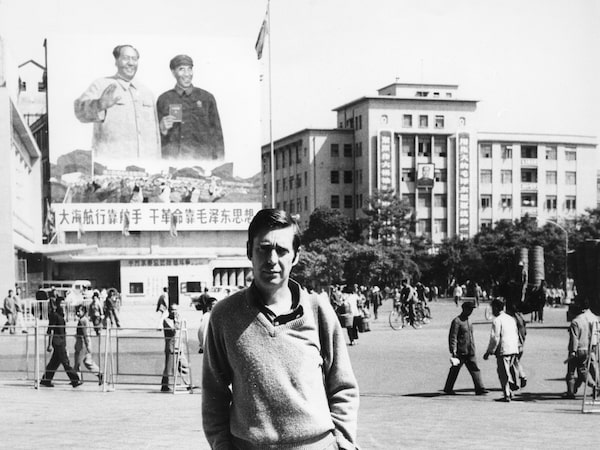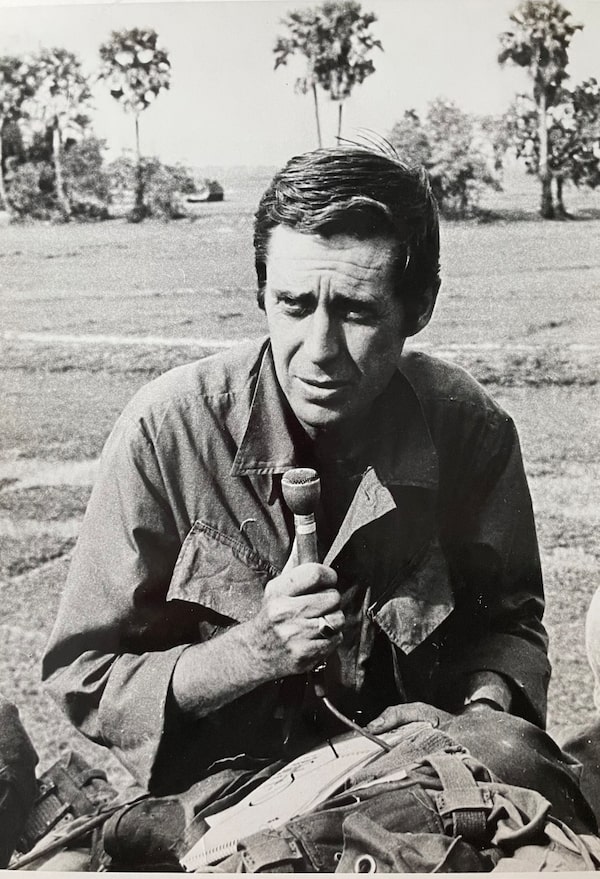
Foreign correspondent Bill Cunningham was a pioneer of television news in Canada as his eye for a good story, his distinctive voice and hard work made him a natural.Handout
Bill Cunningham was the classic foreign correspondent in a trench coat reporting from London or a bush jacket from Vietnam, where he once told viewers, “You can take a taxi from here to the war.” A great writer and a true pioneer of television news in Canada, Mr. Cunningham was also involved in the theory of news and putting it into practice; he was the head of CBC News twice, started the news department at Global Television and was executive producer – and host – of CTV’s W5. Mr. Cunningham died on Jan. 31 at 91.
William Robert Cunningham was born on July 10, 1932, in Yarmouth, N.S. His father, Walter, was a salesman in the oil business, and his mother, Frances, was a nurse. The family moved to Moncton, N.B., when Bill was young, and he grew up there.
From the start, Bill was determined to get into the news business. As a 14-year-old high school student, he wrote a weekly column and worked as a copyboy for a short time at the Moncton Times. The editor there fired him and told him he had no future in the news business. As a teenager, he was in a band where he played the drums, a passion that stayed with him for life.
After high school, he hitchhiked to Toronto and went to Lorne Greene’s Academy of Radio Arts, a school run by the famous actor and announcer known as the “voice of doom” for his wartime broadcasts on the CBC. Many radio and television performers got their start there, and Bill was one of them.
He moved to Vancouver, where he freelanced for CBC Radio and was eventually hired to work full-time.
Mr. Cunningham’s eye for a good story, his natural voice and hard work landed him back in Toronto, first for radio and then for television, which only started in Canada in September of 1952. He was sent to Montreal, where he was the national reporter, doing pieces for the network rather than local news.
The CBC had a weekly documentary program called Newsmagazine, where Mr. Cunningham started as a field producer, working with reporters, such as Tom Gould. The two men produced an early piece on the Vietnam War around 1963. In 1966, Mr. Cunningham went to Budapest to do a documentary on the 10th anniversary of the failed Hungarian Revolution. The subject of the piece was a young woman named Agota Gabor, who left Hungary for Canada. The two were soon married.
Mr. Cunningham had a somewhat complex personal life. He and Agota were married for about six years the first time, they divorced and then remarried and stayed together for 28 years until Mr. Cunningham’s death. They had a daughter together. His first marriage, to Mary Parnell, produced a son and ended in divorce.

Mr. Cunningham in China. He was one of the first Canadian television reporters to file a story from inside China in 1969.Handout
In the mid-1960s, Mr. Cunningham became the chief news editor of CBC TV News. He brought in a lot of changes, but the one that had the most impact was having a reporter read the news. Until that time, professional announcers read the news, and union rules forbade them from changing even a comma in the scripts they were about to read. Mr. Cunningham brought in Stanley Burke, a seasoned field correspondent and made him the reader. He also changed the name of the program from the CBC National News to simply The National.
When Mr. Cunningham demanded too much change, he ran afoul of the CBC managers – men who worked in a nearby building the news staff called the Kremlin – and he was out of the news editor’s job and back in the field.
The handsome, impeccably dressed Mr. Cunningham travelled the world for the CBC. After the news editor’s job, he was posted to Hong Kong in 1968, where he and Ms. Gabor-Cunningham lived for several years. He spent a great deal of time covering the Vietnam War.
“Bill always went the extra mile in dangerous places like Vietnam,” said Peter Kent, a reporter who read The National, a beneficiary of Mr. Cunningham’s reforms. “He had a huge impact on news at three Canadian networks.”
In 1969, he was one of the first Canadian television reporters to file a story from inside China, which until then had been pretty much a closed society, apart from print reporters from The Globe and Mail.
His next foreign posting was in London, where he started working with cameraman Phil Pendry, a relationship lasting more than 30 years and three TV networks.
“Bill Cunningham had two quirks,” said 97-year-old Mr. Pendry from his apartment in Toronto. “He was the best-dressed correspondent I ever worked with – and I worked with at least 50 or 60. And he loved food. You would be lucky to get a coffee break with Michael Maclear [a famous CBC correspondent and contemporary of Mr. Cunningham’s], but Bill always stopped for an amazing lunch.”

Mr. Cunningham reports in Vietnam.Handout
The two men spent so much time together that they got to know how the other thought. Though you couldn’t tell Mr. Cunningham’s politics from his reporting, Mr. Pendry knew where his sympathies lay.
“Politically, Bill was a dyed-in-the-wool socialist but a practising capitalist.”
The London correspondent covered not just Britain and Ireland but the Middle East. In 1967, Mr. Cunningham produced a documentary on the Six-Day War with reporter William Stevenson, who would go on to be known for his many books, including A Man Called Intrepid. The CBC foreign bureaus were filled with a lot of talent. Later, Mr. Cunningham covered the 1973 Yom Kippur War for CBC News.
Soon after that, Mr. Cunningham returned to his desk job as the chief news editor again. He travelled to CBC newsrooms across the country, looking for talent and offering practical advice to young reporters. Again, he was frustrated by the level of bureaucratic meddling from above. He figured he knew more about news than the top brass.
In 1974, Mr. Cunningham decamped for Global, a startup television network where he was vice-president of news. He hired promising young reporters and experienced producers.
“He gave me my first break at Global. I was three months out of school, and he hired me to cover Parliament,” said Gordon Henderson, who went on to work at both the CBC and CTV. “He took chances at Global. He hired Peter Trueman as anchor – a print reporter who was a natural on TV. Bill was a visionary and a revolutionary. He used to say, `We are the Viet Cong of Canadian TV,’ meaning we were taking on the big guys.”
Global News flourished, though Mr. Cunningham spent money as if he were still at the CBC. He left, bought a Chinese junk called Ginseng – sailing was another of his lifelong passions – and spent a while contemplating his future.
His old friend Don Cameron soon came knocking. Mr. Cameron, vice-president of news at CTV, hired Mr. Cunningham as executive producer of W5, the weekly investigative news program. And why waste on-air talent? Mr. Cunningham also appeared on air with two other hosts, Helen Hutchinson and Jim Reed.
Again, he was back travelling the world as a foreign correspondent. He stayed with W5 for more than 10 years.
Gordon Henderson was by this time a producer at W5, on the road with Mr. Cunningham. “He had a real nose for news, and he was a wonderful travelling companion,” said Mr. Henderson, who recalled one long trip in Asia doing stories in Hong Kong, Thailand and Malaysia. “Bill was an old Asia hand and really knew his way around.”
After leaving CTV, he was back at the CBC, this time working for a unit called CBC Newsworld International, which did not broadcast in Canada but was beamed south into the United States and the Caribbean.
“Bill did documentaries using stock footage from his old reports, like the Tet Offensive in Vietnam in 1968 and then going to revisit the country,” said David Burt, who was a senior producer at Newsworld International and also one of the young reporters Mr. Cunningham had hired at Global. “He was a very talented guy. He could appear on camera and run a newsroom.”
Mr. Cunningham retired from the news business when he was 73. But he never stopped thinking about the news. He often went out to lunch with Joe Schlesinger, the retired CBC foreign correspondent, along with Tony Burman, a younger colleague who had been head of news at the CBC.
“Having lunch with those two was like listening to a modern history class,” Mr. Burman said. “Bill had a range of experiences that were unique. He was the last of his kind, travelling to the front lines when the CBC still spent money covering international news.”
Modern technology has a lot to do with that. When Mr. Cunningham was in Vietnam, the film and voice-over would be sent by plane back to Toronto to be developed and then cut to the reporter’s voice track, which had been recorded in the field. Mr. Cunningham had a trick for building a makeshift sound studio; he would cover his head in a trench coat or jacket to muffle the outside sounds while he recorded his voiceover.

Mr. Cunningham walks with his wife Ali Gabor Cunningham, in Budapest.Handout
With the Internet, pictures can be sent instantly, and reporters can voice over war pictures while sitting in a studio thousands of miles away, though many do report from the field.
Mr. Cunningham was obsessed with news and current events, though he did make time for his hobbies. He owned several boats and sailed them on Lake Ontario, the ocean off Florida, and the Caribbean.
He won a Gemini for lifetime achievement and an honorary doctorate from Ryerson University (now Toronto Metropolitan University) in 2009.
Mr. Cunningham leaves his son, Tim, from his marriage to Ms. Parnell; his brother, John Cunningham, a journalist and author in Halifax; his wife, Agota Gabor-Cunningham; their daughter, Kathy Cunningham McPherson; and two grandchildren, Carter and Lexi.
You can find more obituaries from The Globe and Mail here.
To submit a memory about someone we have recently profiled on the Obituaries page, e-mail us at obit@globeandmail.com.